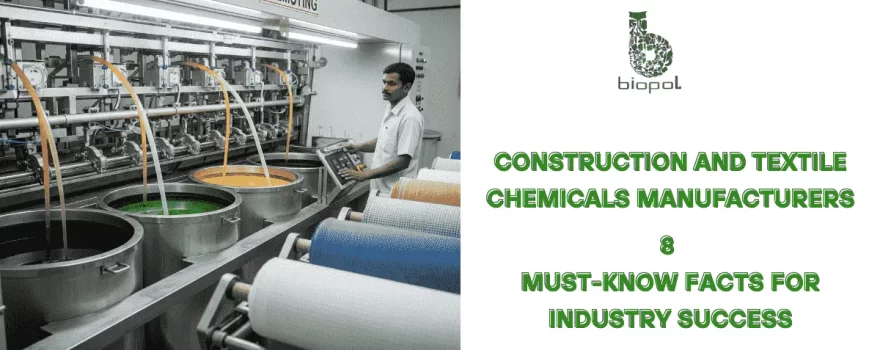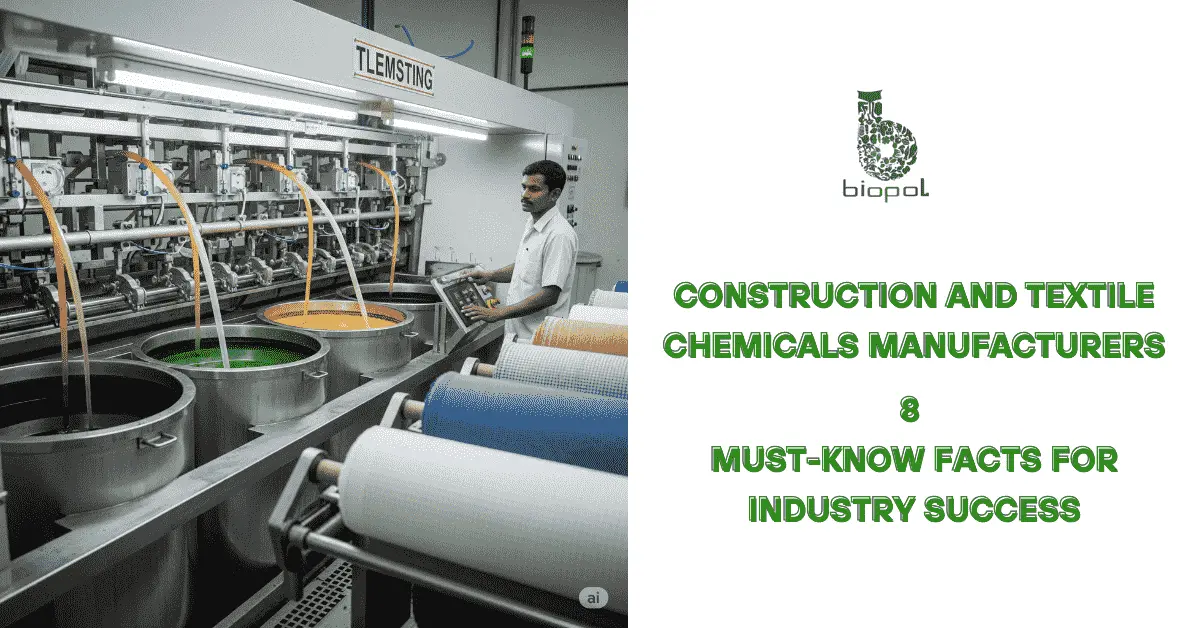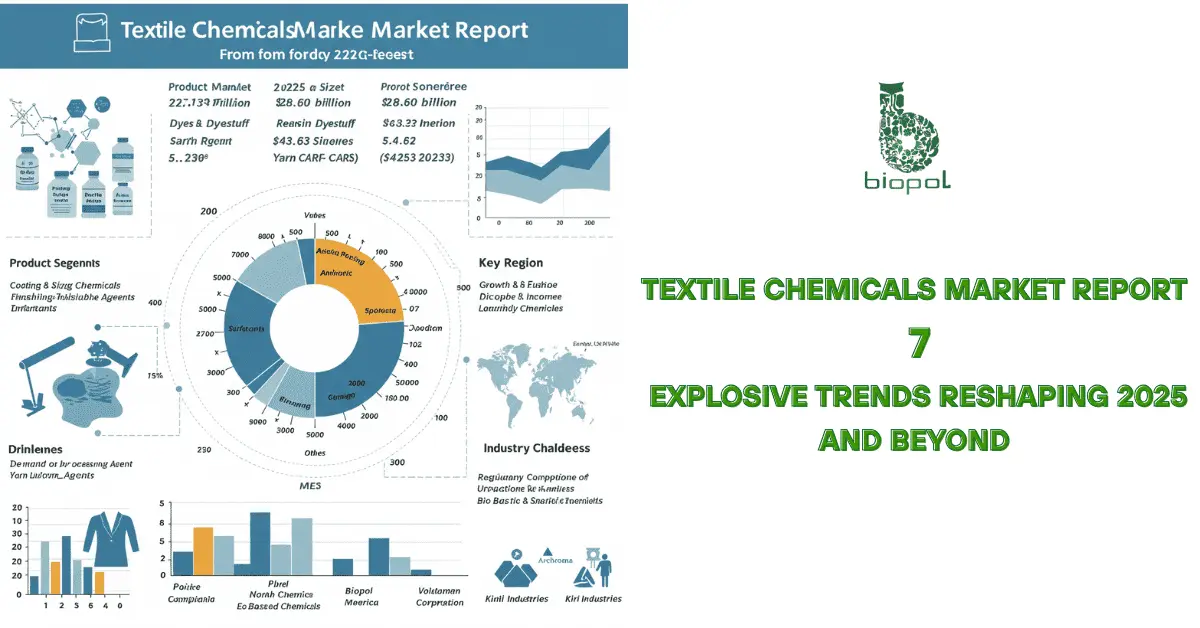
Construction and Textile Chemicals Manufacturers are vital to advancing both industries with innovative, high-performance products. This article explores key product categories, quality benchmarks, market drivers, and partnership tips—equipping buyers with essential knowledge to choose trusted manufacturers and stay ahead in today’s competitive, evolving market.
Table of Contents
Industry Overview
Construction and textile chemicals manufacturers play a critical role in global industrial supply chains. From concrete additives to fabric finishers, their innovations impact everything from skyscraper stability to garment performance.
These manufacturers supply:
- Construction chemicals such as admixtures, waterproofing agents, and curing compounds
- Textile chemicals including pretreatment solutions, dyeing auxiliaries, and functional finishes
Their work supports structural durability, process efficiency, and regulatory compliance. In construction, these chemicals enhance strength, reduce water permeability, and improve setting time. In textiles, they enable colorfastness, softness, and fire resistance.
Construction and textile chemicals manufacturers are essential to advancing material performance while meeting stringent environmental and safety standards. Their role is foundational—quietly supporting the industries that build and clothe the world.
Key Products
Construction and textile chemicals manufacturers focus heavily on three core product categories: additives, auxiliaries, and functional coatings. Each serves a distinct purpose across industrial applications—enhancing strength, improving process efficiency, or delivering end-use performance.
In construction, key additives include:
- Plasticizers and superplasticizers – Improve workability and reduce water usage
- Retarders and accelerators – Control setting time for varying site conditions
- Corrosion inhibitors – Extend the lifespan of reinforced structures
In textiles, auxiliaries are indispensable during processing:
- Wetting agents – Boost penetration of dyes and finishes
- Leveling agents – Achieve uniform coloration
- Softeners – Improve fabric hand feel and wearability
Functional coatings, meanwhile, bridge both industries:
- Hydrophobic and oleophobic finishes – Used on building surfaces and outdoor fabrics
- Anti-microbial and flame-retardant coatings – Crucial for healthcare, hospitality, and industrial uniforms
- UV-resistant treatments – Extend material life under harsh conditions
Construction and textile chemicals manufacturers create these products with end performance in mind. Whether enabling self-healing concrete or stain-resistant apparel, these chemical categories are essential to modern engineering and fabric technology.
Choosing Quality Manufacturers
In the competitive field of construction and textile chemicals, not all manufacturers are built the same. So, what separates dependable partners from short-term vendors? It comes down to five core attributes that buyers can’t afford to overlook.
- Consistent Quality Standards
Reliable manufacturers operate with strict process controls, often backed by ISO certifications, REACH compliance, and eco-label accreditations. Consistency isn’t a luxury—it’s a baseline. - Technical Expertise and R&D Capacity
Whether optimizing a polycarboxylate ether for concrete or adjusting pH levels in textile dyeing, top manufacturers invest heavily in R&D. They don’t just supply chemicals—they solve problems. - Scalable Production and Custom Formulation
From bulk orders to specialized blends, capacity and flexibility matter. Dependable manufacturers offer both scale and precision, reducing the risk of costly delays or mismatched performance. - Regulatory and Environmental Responsibility
Adherence to evolving global standards is essential. Ethical manufacturers minimize environmental impact, reduce hazardous components, and meet the latest safety norms without compromising function. - Responsive Technical Support
Product performance doesn’t end at dispatch. Trusted manufacturers provide application guidance, troubleshooting, and process optimization—backing their products with real-world support.
In short, construction and textile chemicals manufacturers worth partnering with bring more than a product—they bring reliability, innovation, and accountability to every barrel and batch.
Market Trends
Construction and textile chemicals manufacturers are seeing growing demand, driven by infrastructure expansion, sustainability mandates, and smart material innovations. These sectors are shifting quickly—and chemicals are at the core of their transformation.
Key growth drivers include:
- Urbanization in Asia and the Middle East
- Technical textiles for defense, healthcare, and sports
- Sustainability regulations requiring low-VOC and bio-based inputs
- Automation for precision chemical dosing
Emerging opportunities are equally dynamic:
- Green building certifications push eco-compliant additives
- Smart coatings for buildings and garments are gaining traction
- Circular textile models require biodegradable and recyclable auxiliaries
Construction and textile chemicals manufacturers that embrace innovation, compliance, and application-specific customization are best positioned to capitalize. The growth isn’t just quantitative—it’s strategic and selective.
Partner With Experts
Choosing the right construction and textile chemicals manufacturers isn’t just a procurement decision—it’s a strategic move. Industrial performance, regulatory compliance, and product consistency all hinge on the capabilities of your chemical supplier.
Need admixtures that perform in variable climates? Or textile finishes that meet global compliance and market trends? Proven manufacturers offer more than products—they offer trust, agility, and impact.
Before initiating a partnership, assess:
- Track record across regional and global clients
- Transparent documentation and certifications
- Scalable and reliable production capacity
- Application support and technical guidance
Smart buyers don’t gamble with critical inputs. They align with construction and textile chemicals manufacturers who match their operational standards and ambitions. Now is the time to collaborate with specialists who deliver performance—on schedule, on spec, and on target.
Want to assess chemical compatibility before choosing a partner? Start with our in-depth guide on construction and textile chemicals to match your technical requirements with the right product categories and formulations.
FAQs
What are construction and textile chemicals?
Specialized chemicals used to enhance building materials and fabric performance.
Why are reliable manufacturers important?
They guarantee quality, safety, and consistent product performance.
Which chemicals are commonly used in these sectors?
Additives, auxiliaries, and functional coatings.
How is market growth affecting manufacturers?
Rising demand drives innovation and production capacity.
How to choose the right chemical manufacturer?
Look for certifications, technical support, and scalability.
What innovations are shaping the industry?
Eco-friendly chemicals and smart coatings.
Can manufacturers provide custom chemical solutions?
Yes, many offer tailored formulations.
How do environmental regulations impact manufacturers?
They must comply with strict safety and sustainability standards.

